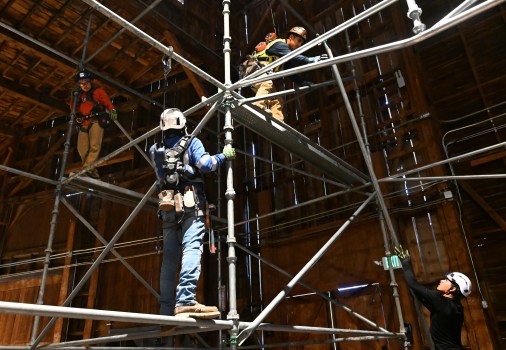The historic Chautauqua Auditorium in Boulder, Colorado, is undergoing significant renovations to prepare for year-round use for the first time in its 127-year history. This upgrade comes ahead of the Sundance Film Festival, set to debut in Boulder in January 2027. The project aims to winterize the open-air venue, allowing it to host performances and events throughout the year, rather than only during the warmer months.
According to Shelly Benford, CEO of the Colorado Chautauqua Association, the decision to winterize the auditorium was driven by the desire to maximize the use of this beloved community asset. “It always seemed like a shame that this beautiful venue was only available to the community for five months a year,” she stated. The renovation began earlier this month and is expected to transform the auditorium into a space that can accommodate concerts and community events even in the coldest months.
The Chautauqua Auditorium has long been a cherished venue, known for its charming features such as creaky floors and wooden trusses. By 2027, it will not only be associated with summer concerts but will also welcome visitors for cozy winter performances. During a recent visit to Boulder, members of the Sundance Film Festival team expressed enthusiasm about the venue, prompting the renovation effort. “They took one look at the place and said, ‘We would love to have this be one of our venues,’” Benford recounted.
To ensure the auditorium can withstand winter conditions, the renovation involves extensive work. Crews are reinforcing original trusses and columns, installing radiant heat tubing beneath the floor, and utilizing a geothermal heating system. Additionally, an insulated interior tent will be erected to maintain warmth without altering the building’s historic appearance.
The project also includes the installation of a modern nitrogen-based fire suppression system and improvements to acoustics and lighting. These upgrades aim to enhance the overall experience for audiences while ensuring accessibility. Jason Hill, Chief Operating Officer of the Chautauqua Association, emphasized the importance of preserving the building’s character while upgrading its facilities. “Our goal is twofold,” Hill explained. “Prepare this iconic space for year-round performances, including Sundance, and protect it through structural interventions to keep it standing strong for generations.”
The renovation is being managed by Boulder-based Smiley Inc., with architectural support from Pel-Ona Architects and Apeiro Design. The team comprises architects, builders, and preservation specialists who are experienced in restoring historic landmarks. Given that the Chautauqua Auditorium is a National Historic Landmark, every aspect of the renovation must adhere to strict preservation guidelines.
Benford noted that the response from the community to the renovation has been overwhelmingly positive. “I expected a lot more concern,” she said, “but people recognize that this is an underused asset. They just want to make sure we preserve what makes it special, and that’s our No. 1 priority.”
As the renovation progresses, the auditorium’s exterior will remain unchanged, and any visible reinforcements will be minimized. The tenting system will be removed each spring, ensuring that the venue retains its historic charm for summer events.
According to Brad Weber, Chief Brand and Development Officer at Chautauqua, the goal is to extend the performance season from five months to twelve. “This really expands Boulder’s venue capacity,” he stated. “It gives local and regional arts organizations a place to perform, create, and connect.”
The auditorium, originally built in 1898 as an open-air hall, has evolved over time, transitioning from dirt floors to concrete and salvaged seating. Its rich history, combined with the exciting renovations, positions the Chautauqua Auditorium as a vibrant hub for arts and entertainment, fostering connections among filmmakers, artists, and audiences in a unique setting.
As work continues, the Chautauqua Auditorium is set to embrace its new identity, ensuring that it remains a vital part of Boulder’s cultural landscape for years to come.
